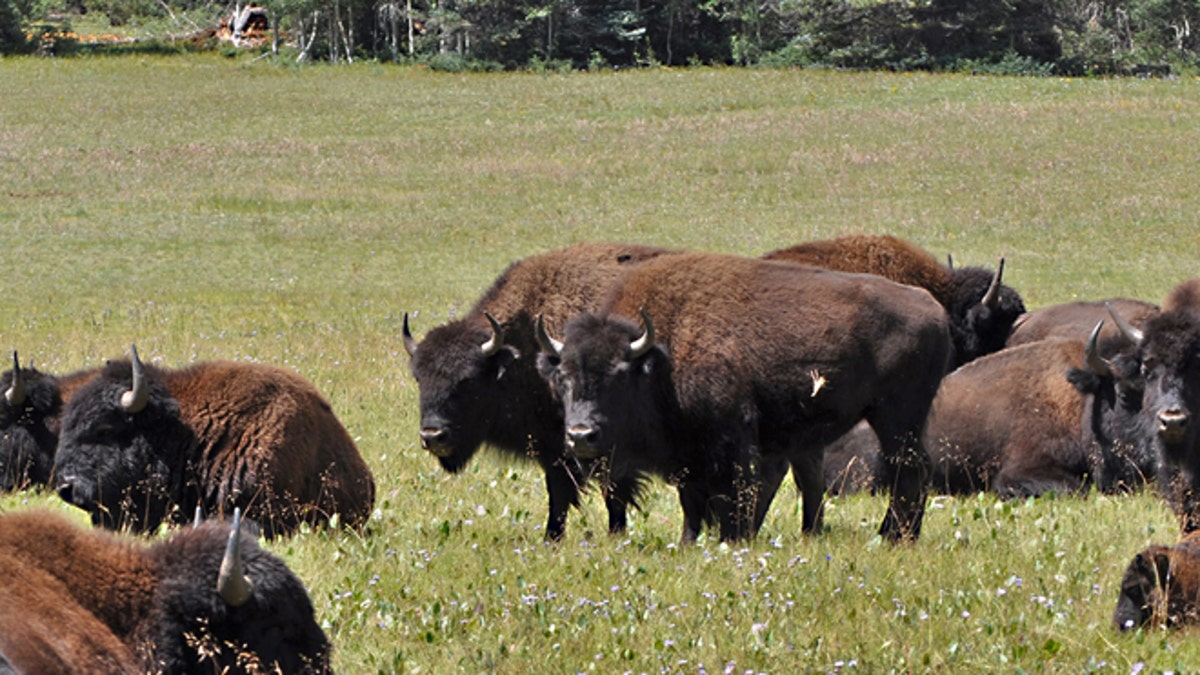
This undated photo provided by Kaibab National Forest shows bison roaming along the House Rock Wildlife Area on the Kaibab National Forestss North Kaibab Ranger District in Arizona. (AP)
FLAGSTAFF, Ariz. – Arizona Sen. John McCain is pushing an amendment in Congress that would allow anyone who kills bison at the Grand Canyon to keep the meat.
Hunting is prohibited at the national park, but land managers are trying to find ways to control hundreds of bison roaming the northern reaches of the Grand Canyon to preserve water resources, vegetation and fragile cliff dwellings. One of the options raised during a public comment period was lethal removal.
The National Park Service has the authority to kill animals that harm resources, using park staff or volunteer shooters. But the shooter cannot keep the meat. Instead, it is handed over to wildlife agencies, tribes or charities to distribute.
McCain's amendment -- one of two he proposed this week as part of the Sportsmen's Act -- would change that. The bison hunt in the northern part of the Kaibab National Forest is highly coveted, McCain said. Allowing hunters to take the full animal would be a service to the national park, he said.
The Arizona Game and Fish Commission voted Friday to support the amendment. Meanwhile, the Sierra Club criticized McCain for interfering in a public process.
"I don't know why anyone would object to the bison meat going to tribal entities or people who are hungry," said Sandy Bahr, director of the Sierra Club's Grand Canyon Chapter. "If it was just about the meat, it would be they (hunters) could go buy that."
McCain's office said the senator's intent isn't to open up the Grand Canyon to hunting. His office said Friday that the amendment would allow the Park Service to work with the Arizona Game and Fish Commission to determine who is authorized to aid in lethal removal, and allow those people to take the full carcasses of bison.
Martha Hahn, the Grand Canyon's chief of resource management, said that's not currently allowed because the bison are considered natural resources that can't be consumed or taken by a visitor.
"The fact is we have regulations," Hahn said. "You can't just turn over resources to the public."
The opportunities for hunters to catch bison in northern Arizona have lessened now that the animals are making their home almost exclusively at the national park. The bison were introduced to the area in the early 1990s as part of a ranching operation to crossbreed them with cattle, creating hybrids known as beefalo or cattalo.
The state of Arizona owns and maintains the estimated 350-450 bison outside the Grand Canyon, which can be hunted on U.S. Forest Service land.
Officials from the Grand Canyon, Arizona Game and Fish Department and the Forest Service are working on a bison management plan expected to be released in the fall of 2016. More than 150 comments were received during a recent public comment period.
Craig McMullen, the Game and Fish's regional supervisor in Flagstaff, said there would be no shortage of volunteers if the public could participate in the lethal removal of bison. He said bison hunting permits are the most sought-after of the state's 10 hunted big game species.
Lance Crowther, of Timberland Outfitters in Flagstaff, said the attraction is that the bison are wild, free-ranging animals that produce a lot of meat. He said he would welcome public participation in controlling the population.
"I would hate to see them send some sort of government shooter in there and deal with it that way," he said.
Bahr suggested McCain's amendment is aimed more at producing trophies for hunters than aiding the Park Service.
"It's pretty outrageous that Sen. McCain is again trying to do an end run around the National Park Service," she said. "People work for decades on these issues, and it's not unlike what he did with air tour noise."
The National Park Service was forced to change its goal for restoring natural quiet at the Grand Canyon after McCain and others pushed a provision in the 2012 federal transportation bill to make half of the park free from commercial air tour noise for at least 75 percent of the day and provide incentives for quiet air technology. The Park Service wanted to make 67 percent of the canyon quiet for three-fourths of the day or longer.












































